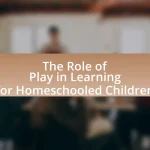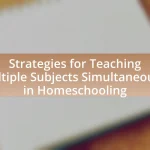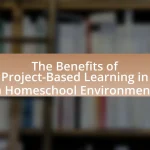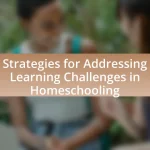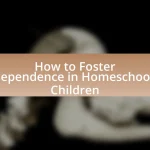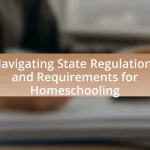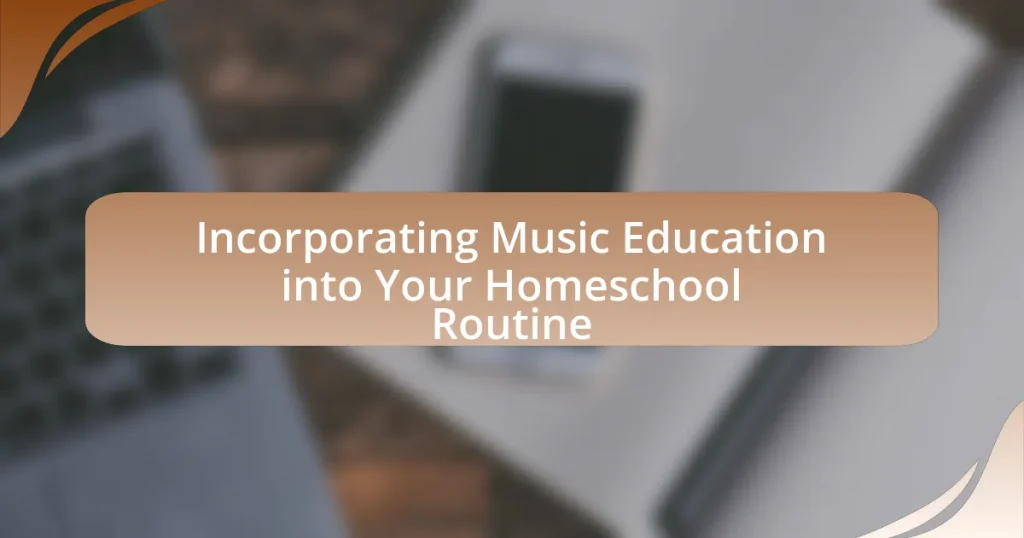Incorporating music education into your homeschool routine involves integrating music theory, instrument lessons, and musical activities into daily learning. Research highlights the cognitive, emotional, and social benefits of music education, including improved academic performance and enhanced creativity. Key components include curriculum development, performance opportunities, and the integration of music with other subjects. Effective methods for implementation involve utilizing technology, creating structured routines, and accessing various resources. Challenges such as resource limitations and varying student engagement can be addressed through personalized instruction and a supportive learning environment.
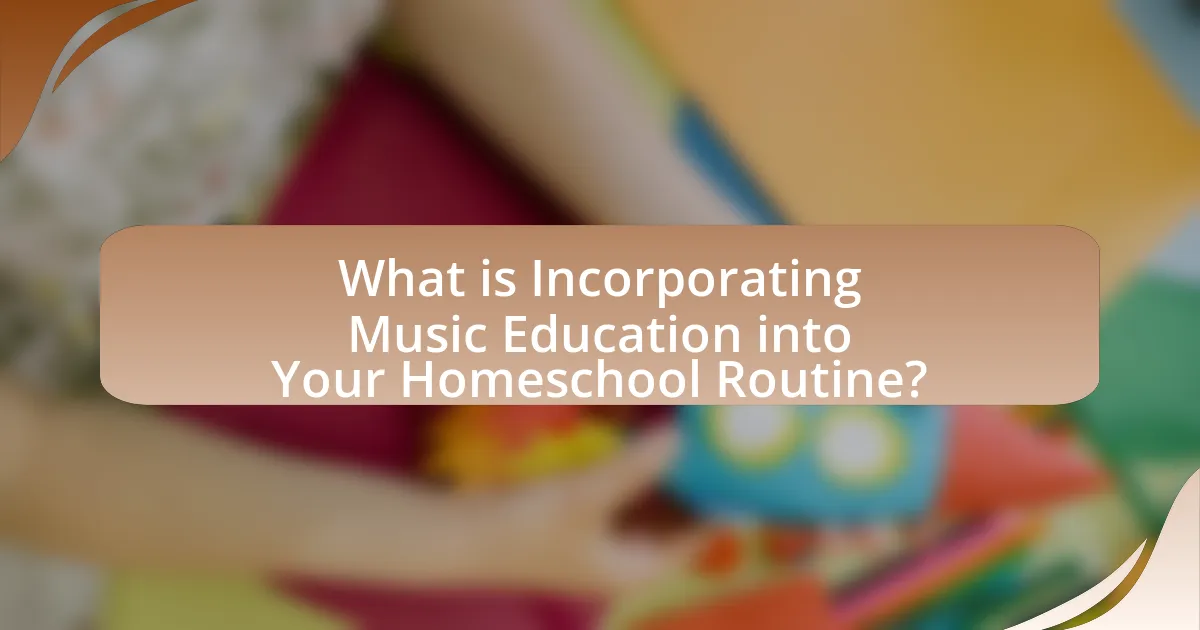
What is Incorporating Music Education into Your Homeschool Routine?
Incorporating music education into your homeschool routine involves integrating music learning and activities into your daily educational framework. This can include teaching music theory, providing instrument lessons, and encouraging participation in musical activities such as singing or composing. Research indicates that music education enhances cognitive skills, improves academic performance, and fosters emotional development, making it a valuable addition to homeschooling. For instance, a study published in the Journal of Research in Music Education found that students engaged in music education showed higher levels of achievement in subjects like math and reading.
How can music education enhance the homeschooling experience?
Music education can enhance the homeschooling experience by fostering creativity, improving cognitive skills, and promoting emotional well-being. Engaging in music education allows students to develop critical thinking and problem-solving abilities, as studies show that music training can enhance brain function and academic performance. For instance, research published in the journal “Psychological Science” indicates that children who receive music lessons demonstrate improved language skills and mathematical abilities compared to their peers without such training. Additionally, music education provides a unique outlet for self-expression, which can lead to increased confidence and social skills, further enriching the homeschooling environment.
What are the key components of music education in a homeschool setting?
The key components of music education in a homeschool setting include curriculum development, instrument instruction, music theory, performance opportunities, and integration with other subjects. Curriculum development involves selecting age-appropriate materials that cover various music genres and history. Instrument instruction focuses on teaching students how to play specific instruments, enhancing their practical skills. Music theory education provides foundational knowledge about reading music, understanding rhythm, and composing. Performance opportunities allow students to showcase their skills, fostering confidence and public speaking abilities. Finally, integrating music with other subjects, such as math and language arts, reinforces learning and demonstrates the interdisciplinary nature of music.
How does music education support overall child development?
Music education supports overall child development by enhancing cognitive skills, emotional expression, and social interaction. Research indicates that children engaged in music education demonstrate improved language development, better memory, and increased mathematical skills due to the complex cognitive processes involved in learning music. For instance, a study published in the journal “Psychological Science” by researchers at the University of California found that music training significantly boosts verbal memory and literacy skills. Additionally, music education fosters emotional intelligence by allowing children to express feelings and understand others’ emotions through musical interpretation. Socially, participating in group music activities promotes teamwork and communication skills, as children learn to collaborate and share ideas. Thus, music education is a vital component of holistic child development, impacting various aspects of their growth.
Why is music education important for children?
Music education is important for children because it enhances cognitive development and fosters emotional expression. Studies show that children engaged in music education demonstrate improved language skills, better memory, and higher academic performance. For instance, research published in the journal “Psychological Science” indicates that music training can lead to enhanced verbal memory and literacy skills. Additionally, music education promotes social skills and teamwork through group activities, which are essential for personal development.
What cognitive benefits does music education provide?
Music education provides significant cognitive benefits, including enhanced memory, improved language skills, and better mathematical abilities. Studies have shown that children who participate in music education demonstrate superior verbal memory and literacy skills compared to those who do not engage in musical training. For instance, research published in the journal “Psychological Science” by Moreno et al. (2011) found that music training positively influences language processing and reading skills. Additionally, music education has been linked to improved spatial-temporal skills, which are crucial for problem-solving in mathematics, as evidenced by a study from Rauscher and Zupan (2000) that indicated music training enhances spatial reasoning abilities. These cognitive advantages underscore the importance of integrating music education into learning environments.
How does music education foster creativity and self-expression?
Music education fosters creativity and self-expression by providing students with the tools to explore and communicate their emotions through sound. Engaging in music activities, such as playing instruments or composing, encourages individuals to think innovatively and develop unique artistic voices. Research indicates that students involved in music education demonstrate higher levels of creativity, as evidenced by a study published in the Journal of Research in Music Education, which found that music students scored significantly higher on creativity assessments compared to their non-music peers. This environment of exploration and experimentation allows learners to express their individuality, enhancing their overall personal development.
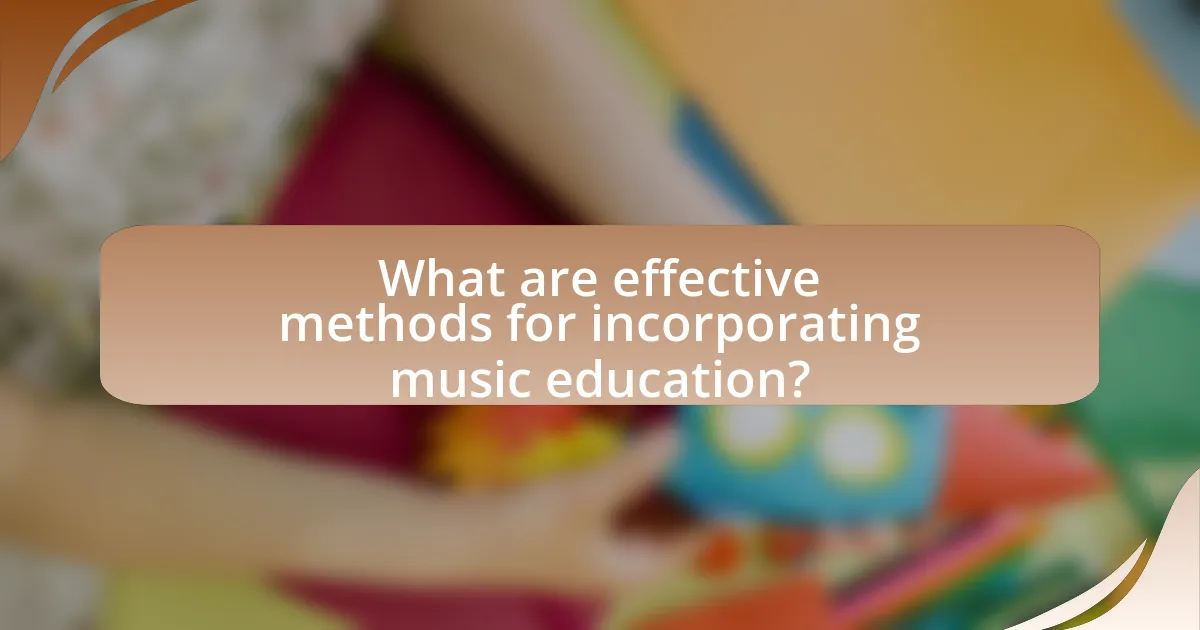
What are effective methods for incorporating music education?
Effective methods for incorporating music education include integrating music into daily activities, utilizing technology for interactive learning, and providing hands-on experiences with instruments. Research shows that children who engage in music education demonstrate improved cognitive skills and academic performance. For instance, a study published in the Journal of Research in Music Education found that students involved in music programs scored higher on standardized tests compared to their peers. Additionally, incorporating music theory and history into lessons can enhance understanding and appreciation of music, further enriching the educational experience.
How can parents integrate music lessons into daily routines?
Parents can integrate music lessons into daily routines by scheduling specific times for practice and incorporating music-related activities into existing family routines. For instance, parents can designate a 15-30 minute block each day for focused music practice, ensuring consistency and structure. Additionally, they can integrate music into daily activities, such as playing background music during meals or using songs to teach concepts in other subjects, which enhances learning and retention. Research indicates that regular exposure to music can improve cognitive skills and emotional development in children, making this integration beneficial for overall growth.
What resources are available for teaching music at home?
Resources available for teaching music at home include online platforms, instructional books, and music apps. Online platforms such as YouTube offer a vast array of free tutorials and lessons for various instruments and music theory. Instructional books provide structured learning paths and exercises, with popular series like “Alfred’s Basic Piano Library” and “Essential Elements” for band instruments. Music apps like Yousician and Simply Piano offer interactive lessons and feedback, making learning engaging and accessible. These resources collectively support a comprehensive music education at home, catering to different learning styles and preferences.
How can technology enhance music education in homeschooling?
Technology can enhance music education in homeschooling by providing access to a wide range of online resources, interactive tools, and virtual lessons. For instance, platforms like YouTube offer tutorials and performances that can help students learn various instruments and music theory. Additionally, software applications such as GarageBand and Sibelius allow students to compose, edit, and produce music digitally, fostering creativity and technical skills. Research indicates that students using technology in music education demonstrate improved engagement and retention of musical concepts, as evidenced by a study published in the Journal of Music Education Research, which found that technology integration led to a 30% increase in student participation and interest in music lessons.
What types of music education activities can be included?
Music education activities can include instrument lessons, singing, music theory, composition, and music appreciation. Instrument lessons provide hands-on experience with various instruments, enhancing motor skills and musical understanding. Singing activities develop vocal skills and pitch recognition, while music theory lessons teach the fundamentals of music notation and rhythm. Composition encourages creativity and personal expression through original music creation. Music appreciation exposes students to different genres and historical contexts, fostering a broader understanding of music’s role in culture. These activities collectively contribute to a well-rounded music education experience.
What are some engaging music games for children?
Engaging music games for children include “Musical Chairs,” “Freeze Dance,” and “Rhythm Relay.” These games promote active participation and enhance musical skills. For instance, “Musical Chairs” encourages listening and quick movement, while “Freeze Dance” helps children learn to control their bodies in response to music. “Rhythm Relay” fosters teamwork and rhythm recognition, as children pass an object while maintaining a beat. Research indicates that music games can improve cognitive development and social skills in children, making them effective tools for music education in a homeschool setting.
How can parents create a music curriculum tailored to their child’s interests?
Parents can create a music curriculum tailored to their child’s interests by first assessing their child’s musical preferences and strengths. This can be achieved through discussions about favorite genres, instruments, or artists, and by observing their engagement with different types of music. Once interests are identified, parents can select resources such as books, online courses, or local music classes that align with these preferences. For example, if a child enjoys pop music, parents can incorporate lessons on popular song structures and songwriting techniques. Additionally, integrating hands-on activities like instrument practice or music composition projects can enhance engagement. Research indicates that personalized learning approaches significantly improve student motivation and achievement, supporting the effectiveness of a tailored curriculum.
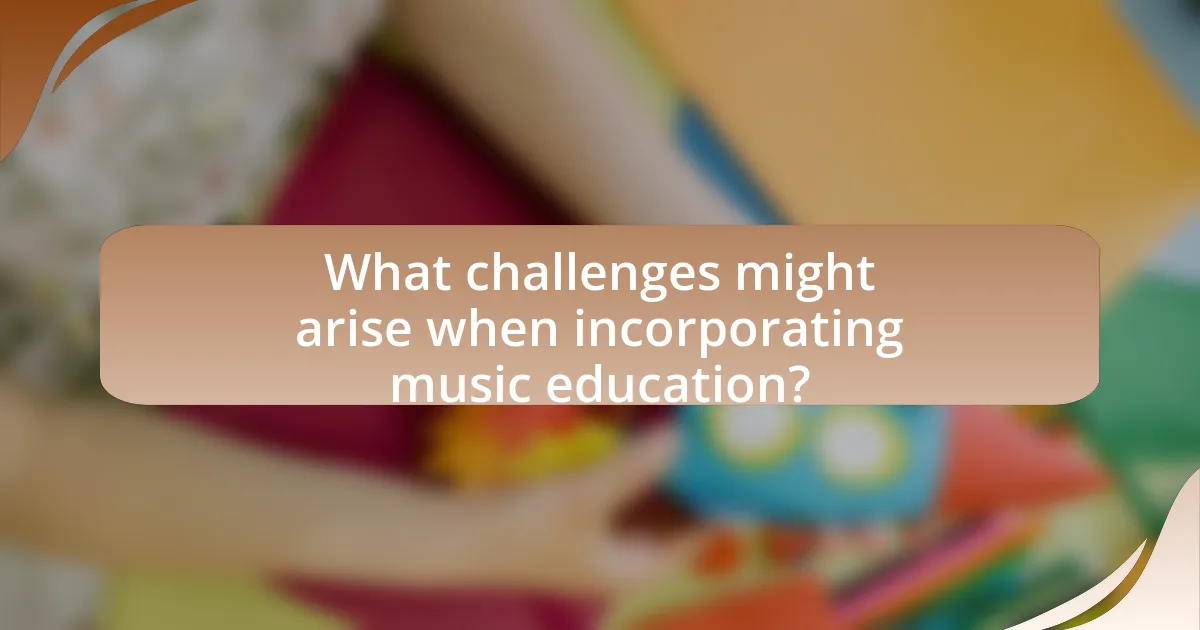
What challenges might arise when incorporating music education?
Incorporating music education can present several challenges, including resource limitations, curriculum integration, and varying student engagement levels. Resource limitations often arise from a lack of access to instruments, materials, or qualified instructors, which can hinder effective music education. Curriculum integration poses a challenge as educators must find ways to blend music education with other subjects, ensuring a cohesive learning experience. Additionally, varying levels of student engagement can lead to disparities in learning outcomes, as some students may show more interest or aptitude in music than others, complicating the teaching process. These challenges highlight the complexities involved in successfully implementing music education within a homeschool routine.
How can parents overcome common obstacles in music education?
Parents can overcome common obstacles in music education by establishing a structured routine, utilizing online resources, and fostering a supportive environment. A structured routine helps children allocate specific time for music practice, which is essential for skill development. Online resources, such as instructional videos and virtual lessons, provide accessible learning materials that can supplement traditional methods. Additionally, creating a supportive environment encourages children to express themselves musically without fear of judgment, which is crucial for their growth and confidence in music. Research indicates that consistent practice and a positive learning atmosphere significantly enhance musical proficiency and enjoyment.
What strategies can help maintain a child’s interest in music?
To maintain a child’s interest in music, incorporating diverse musical experiences is essential. Engaging children with various genres, instruments, and interactive activities can spark curiosity and enjoyment. Research indicates that children exposed to a wide range of musical styles are more likely to develop a lasting appreciation for music. Additionally, involving children in music-making activities, such as group lessons or family jam sessions, fosters a sense of community and collaboration, which enhances their motivation. Providing opportunities for performance, whether in informal settings or structured recitals, can also boost confidence and sustain interest.
How can parents address varying skill levels among children?
Parents can address varying skill levels among children by implementing differentiated instruction tailored to each child’s unique abilities. This approach allows parents to provide personalized learning experiences, such as offering advanced music theory to more skilled children while focusing on basic rhythm and melody for those who are beginners. Research indicates that differentiated instruction can lead to improved student engagement and achievement, as it meets learners at their current level and challenges them appropriately. For instance, a study published in the “Journal of Educational Psychology” found that students who received differentiated instruction showed a 20% increase in performance compared to those who did not. By utilizing this method, parents can effectively support each child’s musical development within a homeschooling environment.
What are the best practices for successful music education at home?
The best practices for successful music education at home include establishing a structured routine, utilizing diverse resources, and fostering a supportive environment. A structured routine helps students develop discipline and consistency, which are crucial for mastering musical skills. Utilizing diverse resources, such as online tutorials, music apps, and instructional books, caters to different learning styles and keeps students engaged. Additionally, fostering a supportive environment encourages creativity and exploration, allowing students to express themselves musically without fear of judgment. Research indicates that children who receive consistent music education show improved cognitive skills and emotional development, reinforcing the importance of these practices in a home setting.
How can parents assess their child’s progress in music education?
Parents can assess their child’s progress in music education by regularly monitoring their skill development through structured evaluations and informal observations. Structured evaluations can include periodic assessments such as performance recitals, graded tests, or progress reports from music instructors, which provide measurable benchmarks of the child’s abilities. Informal observations involve listening to the child play or sing, noting improvements in technique, rhythm, and expression over time. Research indicates that consistent feedback and practice can lead to significant advancements in musical skills, as highlighted in studies by the National Association for Music Education, which emphasize the importance of regular assessment in fostering musical growth.
What tips can help create a supportive music learning environment?
To create a supportive music learning environment, establish a consistent routine that includes dedicated time for music practice and exploration. This structure helps students develop discipline and fosters a sense of commitment to their musical education. Additionally, providing access to a variety of musical resources, such as instruments, sheet music, and online tutorials, encourages creativity and engagement. Research indicates that environments rich in musical stimuli enhance cognitive development and emotional well-being, making it essential to create a space that is both inspiring and conducive to learning.
What resources can assist in implementing music education effectively?
Resources that can assist in implementing music education effectively include structured curricula, online platforms, and community programs. Structured curricula, such as the “Music for Young Children” program, provide a comprehensive framework for teaching music concepts and skills. Online platforms like “SmartMusic” offer interactive tools for practice and assessment, enhancing student engagement. Additionally, community programs, such as local music schools or orchestras, often provide workshops and classes that can supplement home education. These resources collectively support a well-rounded approach to music education, ensuring that students receive diverse learning experiences.
What online platforms offer music education courses for homeschoolers?
Online platforms that offer music education courses for homeschoolers include Coursera, Udemy, and TakeLessons. Coursera provides courses from accredited institutions, covering various music topics, while Udemy offers a wide range of music courses tailored for different skill levels. TakeLessons specializes in personalized music lessons, connecting students with instructors for one-on-one sessions. These platforms are recognized for their comprehensive content and flexibility, making them suitable for homeschoolers seeking structured music education.
How can local community resources enhance music education opportunities?
Local community resources can significantly enhance music education opportunities by providing access to instruments, expert instruction, and collaborative experiences. Community centers often offer music classes and workshops led by experienced musicians, which can supplement homeschooling curricula. Additionally, local schools and music stores may provide instrument rental programs, making it more affordable for families to access quality instruments. Research indicates that community engagement in music education fosters a sense of belonging and motivation among students, leading to improved learning outcomes. For instance, a study by the National Endowment for the Arts found that students involved in community music programs showed higher levels of academic achievement and social skills.
What are practical tips for incorporating music education into your homeschool routine?
Incorporating music education into your homeschool routine can be achieved through structured activities, resources, and consistent practice. Start by integrating music lessons into your weekly schedule, dedicating specific days for instrument practice, music theory, and listening sessions. Utilize online platforms like YouTube for tutorials and music theory lessons, which provide accessible and diverse content. Additionally, consider using music education apps that offer interactive learning experiences, such as ear training and rhythm exercises.
Engaging in group activities, such as forming a family band or participating in local music classes, can enhance motivation and provide social interaction. Research indicates that music education improves cognitive skills, including memory and language development, making it a valuable addition to your curriculum. By consistently incorporating these elements, you can create a well-rounded music education experience in your homeschool routine.

